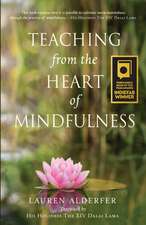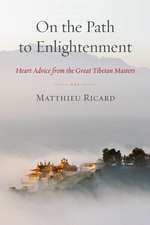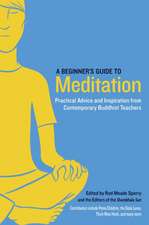Knowing Body, Moving Mind
Autor Patricia Q Campbellen Limba Engleză Paperback – 2 sep 2011
Preț: 259.71 lei
Nou
Puncte Express: 390
Preț estimativ în valută:
49.70€ • 51.70$ • 41.03£
49.70€ • 51.70$ • 41.03£
Carte tipărită la comandă
Livrare economică 14-28 aprilie
Preluare comenzi: 021 569.72.76
Specificații
ISBN-13: 9780199793815
ISBN-10: 0199793816
Pagini: 250
Dimensiuni: 152 x 231 x 18 mm
Greutate: 0.34 kg
Editura: Oxford University Press
Locul publicării:New York, United States
ISBN-10: 0199793816
Pagini: 250
Dimensiuni: 152 x 231 x 18 mm
Greutate: 0.34 kg
Editura: Oxford University Press
Locul publicării:New York, United States
Descriere
Knowing Body, Moving Mind investigates ritualizing and learning in introductory meditation classes at two Buddhist centers in Toronto, Canada. The centers, Friends of the Heart and Chandrakirti, are led and attended by Western (sometimes called "convert') Buddhists: that is, people from non-Buddhist familial and cultural backgrounds. Inspired by theories that suggest that rituals impart new knowledge or understanding, Patricia Campbell examines howintroductory meditation students learn through formal Buddhist practice. Along the way, she also explores practitioners' reasons for enrolling in meditation classes, their interests in Buddhism, and their responses to formal Buddhist practices and to ritual in general. Based on ethnographic interviews and participant-observation fieldwork, the text follows interview participants' reflections on what they learned in meditation classes and through personal practice, and what roles meditation and other ritual practices played in that learning. Participants' learning experiences are illuminated by an influential learning theory called Bloom's Taxonomy, while the rites and practices taught and performed at the centers are explored using performance theory, amethod which focuses on the performative elements of ritual's postures and gestures. But the study expands the performance framework as well, by demonstrating that performative ritualizing includes the concentration techniques that take place in a meditator's mind. Such techniques are received as traditional mental acts or behaviors that are standardized, repetitively performed, and variously regarded as special, elevated, spiritual or religious. Having established a link between mental and physical forms of ritualizing, the study then demonstrates that the repetitive mental techniques of meditation practice train the mind to develop new skills in the same way that physical postures and gestures train the body. The mind is thus experienced as bothembodied and gestural, and the whole of the body as socially and ritually informed.
Notă biografică
Patricia Q. Campbell is a scholar of contemporary Western Buddhism and ritual studies. She has published articles based on ethnographic studies of Western Buddhists in Canada, and teaches in the areas of ritual studies and eastern religions. She lives with her husband in Toronto, Ontario.












